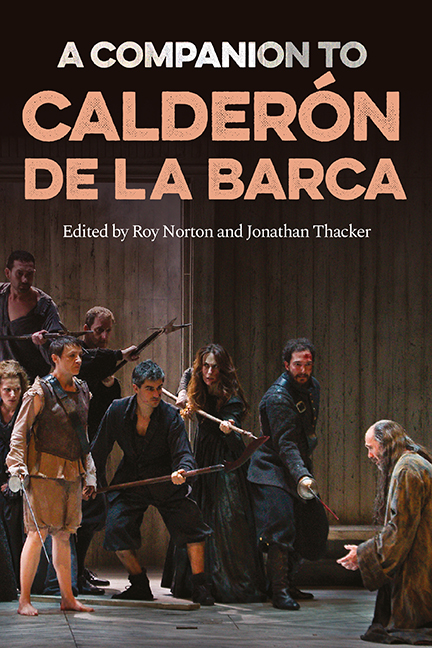Book contents
- Frontmatter
- Dedication
- Contents
- List of Illustrations
- List of Contributors
- Acknowledgements
- List of Abbreviations
- Introduction
- 1 Biography and Context
- 2 The Calderonian World
- 3 The Playwright’s Craft: Calderón and the Great Theatrical World of Early Modern Spain
- 4 La vida es sueño
- 5 The Honour Plays of Calderón
- 6 Calderón, the Comedian
- 7 Mythological Court Spectacle Plays
- 8 Religious comedias
- 9 Calderón’s ‘Sacramental, Allegorical and Historical’ autos
- 10 Calderón’s graciosos
- 11 Calderón and Visual Art
- 12 The Staging of Calderón’s Theatre
- 13 Calderón’s European Reception from Romanticism to the Twentieth Century
- 14 The Reception of Calderón in the Hispanic World
- Appendices
- Consolidated Bibliography
- Index
- Tamesis • Companions
6 - Calderón, the Comedian
Published online by Cambridge University Press: 07 October 2022
- Frontmatter
- Dedication
- Contents
- List of Illustrations
- List of Contributors
- Acknowledgements
- List of Abbreviations
- Introduction
- 1 Biography and Context
- 2 The Calderonian World
- 3 The Playwright’s Craft: Calderón and the Great Theatrical World of Early Modern Spain
- 4 La vida es sueño
- 5 The Honour Plays of Calderón
- 6 Calderón, the Comedian
- 7 Mythological Court Spectacle Plays
- 8 Religious comedias
- 9 Calderón’s ‘Sacramental, Allegorical and Historical’ autos
- 10 Calderón’s graciosos
- 11 Calderón and Visual Art
- 12 The Staging of Calderón’s Theatre
- 13 Calderón’s European Reception from Romanticism to the Twentieth Century
- 14 The Reception of Calderón in the Hispanic World
- Appendices
- Consolidated Bibliography
- Index
- Tamesis • Companions
Summary
As a writer of comic drama Calderón is a neglected figure: most engagement with his theatre since the nineteenth century, by scholars, translators and directors, is with his fine serious plays – usually termed dramas in Spanish – many of which are explored in this volume. The playwright left us no dramatic manifesto or overarching description of his comic (or tragic) vision against which to measure his output and a prevailing genre elitism has contributed to this marginalisation of his more comic works and a concomitant assumption that he was himself a dour figure sadly lacking a humorous side.
Yet Calderón began his professional playwriting career in the comic mode; the largest proportion of his full-length works written for the public stages or for palace performance were comedies, he turned his hand to farcical entremeses [interludes] as well as at least one burlesque play, Céfalo y Pocris [Cephalus and Procris; date uncertain], and he even acted himself in the part-improvised comedias de repente [impromptu plays] with which favoured contemporary dramatists entertained the court of Philip IV in the 1630s. Though rarely emphasised, these facts are hardly surprising in a context shaped by the dramatic writing of Lope de Vega and his imitators, in which comic plays predominated.
This chapter aims first to establish what patterns, themes and conventions Calderón had in mind when he chose to write in the comic mode as a young man in the 1620s. It then traces, in broad brushstrokes, how his comic model developed. Although he reworked a number of his comic plays later in life, his writing of them all but ended with the lengthy closure of the theatres in the 1640s and his taking of Holy Orders in 1651. The evolution in his comic writing through the 1620s and 1630s reveals the remarkable skill and verve he brought to the form and perhaps reflects his changing attitudes to the world in which he was living. This is especially evident from a group of more bitter plays from the late 1630s with which we shall conclude this chapter. Close reference will be made to some key and representative play-texts to shine a light on Calderón's idea of comedy, though no attempt is made to be exhaustive here.
- Type
- Chapter
- Information
- A Companion to Calderón de la Barca , pp. 110 - 131Publisher: Boydell & BrewerPrint publication year: 2021



